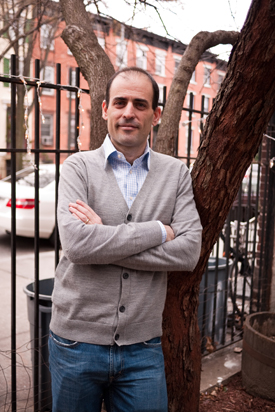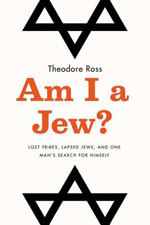Am I a Jew?: Six Questions for Theodore Ross
Theodore Ross discusses the history and evolution of American Judaism and recounts his attempt to reconcile with his childhood alienation from his Jewish heritage.

Theodore Ross is the features editor at Men’s Journal and a former associate editor at Harper’s Magazine. When he was nine years old, his mother moved him and his brother from New York to Mississippi and attempted to erase all traces of the family’s Judaism, identifying them as Unitarians to their new neighbors. Ross wrote about the experience in a 2009 Harper’s essay titled “Shalom on the Range.” In his just-published book, Am I a Jew?, he tracks the history and evolution of American Judaism, detailing his efforts to reconcile with his childhood alienation from his heritage by traveling to Jewish communities across the U.S. and Israel. I asked him six questions about the book over non-kosher beverages near his apartment in Brooklyn:
1. In your research you traveled among “crypto-Jews”—those whose ancestors hid their Judaism—in New Mexico, Orthodox Jews in upstate New York, and flag–saluting Reform Jews in Kansas City. You also went to Israel. Has your definition of Judaism changed? And have you answered your titular question?
No. I don’t think I’m in any greater position of certitude after completing the book than I was at the beginning. I didn’t set out necessarily in a literal-minded way to answer whether or not I was Jewish. By any reasonable measure, genealogically I’m Jewish; my mother’s line as far back as anybody knows is Jewish; I was genetically tested during the research for the book, and they confirmed it. I got the check, I am a Jew. For me the greater question was, What exactly does that mean? The more I drilled down into that, the more I realized that it’s a question that really can’t be answered in any particular kind of way. And the process of trying to answer it—the thought process, the critical thinking that goes into what constitutes a Jew, particularly in the United States—that, for me, is Judaism.
From Am I a Jew?:
There is, admittedly, a certain Hebraic quality in even asking such a question. What other faith conjures up so much doubt in its adherents? It is fundamental to the religion itself. Do you speak Hebrew? Great if you do, but if you don’t, you can still be a Jew. Were you bar-mitzvahed? Nice (such a good boy!), but plenty of Jews aren’t. Kosher, not kosher; kosher at home; kosher only if there are no Catholics around; kosher except for bacon, except for shrimp, except for cheeseburgers, only on the good china, never in school, never when it’s embarrassing. Have you been to Israel? Did you wail at the Wailing Wall? Do you consider Israel a fascist state? Was your mother Jewish? When was the last time you went to temple? Quick—what’s the difference between the Talmud, the Mishnah and the Gamara? (Hint: it’s a trick question.) Do you believe in God? Are you a Jew for Jesus? A Crypto-Jew? Are you a cultural Jew, and if so, what is your opinion of Woody Allen’s latest film? Do you find Heeb Magazine amusing? Sammy Davis, Jr.? Were you born Jewish? Did you convert? Did the rabbi send you away three times before he gave you the secret codes to the international bank accounts? Where do you get a bagel in this town?
2. At one point you traveled to New Mexico to visit a community of people who grew up Catholic and have come to believe they’re Jewish because of various family legends or customs they’ve later learned to be traditionally Judaic. Are they really Jewish? Is their practice Jewish if there’s no specifically Jewish intent behind it?
Or even, if there is a Jewish intent behind those rituals, does that make it Jewish? You could be a self-identified crypto-Jew in Albuquerque whose grandmother lit candles on Friday night and didn’t move around on Saturday, and she communicates to you, “We do this because somos judíos”—which is a very typical crypto-Jewish story—you know, your grandmother, your aunt is on the deathbed, and she pulls you over, she says, mijo, come here, and then she tells you that you’re Jewish as she expires. But what if she’s wrong? What if she’s not Jewish? She believed it. Is that Jewish?
For me the crypto-Jews who were willing to say to themselves, “This is my history, this is my heritage, I’m going to live as a Jew now, and perhaps even convert”—I was certainly not going to argue with them. I didn’t go to New Mexico to determine the validity of what they were saying. I was interested in what it said about the broader question of Judaism, and also about myself. Because I felt like, even in the fictional aspect, if these lost Jews could be reclaimed in some conceptual way, well, what about me? Someone who had been disconnected from the faith in a much more linear fashion—maybe I could be redeemed.
3. In the book you seem puzzled by your mom’s logic in keeping your Jewishness hidden, and you have a brief dialogue with her about it. She had this idea that you couldn’t be “all-American” if you were Jewish. To what extent do you find that longing common to other American ethnic groups?
My mother had a desire to create this American myth for herself. And having to be this Other, even if it was accepted, wasn’t good enough. She wanted to be American on her own terms, in her own way, without asking permission, without making apologies. Today, in our more heterogeneous society, we’re farther away from our European backgrounds than we were fifty years ago. So for me the way to define myself as American is to claim some of that specificity, some of that history. Whereas for the Fifties generation it was to claim some of that anonymous, restless, rootless American ideal.
When I started writing my crypto-Jews piece for Harper’s, my initial instinct was to make it about Jews in America, but I think the things I set out to understand and define could be transported along the ethnic and religious spectrum in the United States. And I feel like the questions I’m asking are a byproduct and a result and an animating part of the American social experiment.
4. Many of the Orthodox people you talk to came to their religious practice in adolescence or adulthood. It was surprising to read about families in Brooklyn who had grown up secular and were now Hasidic; I had always thought of Orthodoxy as being passed down from a long, iron-clad historical tradition.
Orthodoxy is a relatively new phenomenon. Reform Judaism is at least as old, if not older. Both came out of reactions to the Enlightenment—in very different ways, obviously. Some of the Jews who came to the United States during the great period of migration from Europe, from the 1880s to 1920, were Orthodox to an extent. Here, it didn’t quite work for them. So you might find a “residually Orthodox” person living out in Flatbush who was a member of an Orthodox temple, and when he was out among his peers, was kosher, and keeping the Sabbath. But at home he’s flipping on the radio and having a BLT.
The idea in the Fifties was that Orthodoxy would disappear. That was a period in which Reform Judaism and liberal Judaism seemed ascendant. And to an extent it did disappear. Those residually Orthodox people, they died; their children became Reform or Buddhist or “just Jewish.” The thing they didn’t anticipate was that there would also be a group of people who would return to Orthodoxy in a much more vibrant and spiritually directed way, where that outside-of-the-house/inside-of-the-house thing doesn’t exist. And many of those people were not descended of the residually Orthodox. They came from any number of backgrounds.
5. You visited an old-school Reform community in Kansas City that was battling a new rabbi who was shifting it away from its traditions and toward a more religiously oriented practice, and you also spoke with Reboot, a New York City organization selling hipster Judaism to a younger generation. Each of these groups is struggling to define Judaism for Jews who associate more with the culture than the religion, and who may not view preserving American Jewish identity as an essential task. Do their experiences suggest that cultural Judaism in America will someday die out?

Both the Rebooters and the Kansas City people are trying to address the idea of whether or not an organized but not observant form of Judaism really has a reason to exist, I think. So when the Rebooters are encouraging you to observe the Sabbath, but in a very, very mild way, for example with the National Day of Unplugging, where they tell you to drink wine, go to the park—all things that I would probably be doing anyway—how useful is that? The alternative side of that is the very liberal Reformists in Kansas City who are not changing with the times. There’s no guarantee that either of those formulations of essentially secular Judaism have a valid reason to be around.
Douglas Rushkoff wrote a very smart book on Judaism called Nothing Sacred, in which he says he wouldn’t be bothered if Judaism as a formal and organized religion were to disappear from the face of the earth. What he’s interested in is the ethical system, the things upon which the religion we call Judaism is constructed. As long as those still exist and are disseminated into the world and have passed on through the generations, then he’s okay with it. I go back and forth on that question. There is something to be said for the ethical motivation for Judaism and why it exists. But there’s also identity, and being a people.
6. Were there other Jewish writers or books that you looked to as influences or templates for Am I a Jew?
From the Guide to the Perplexed:
I do not presume to think that this treatise settles every doubt in the minds of those who understand it, but I maintain that it settles the greater part of their difficulties. No intelligent man will require and expect that on introducing any subject I shall completely exhaust it; or that on commencing the exposition of a figure I shall fully explain all its parts. Such a course could not be followed by a teacher in a viva voce exposition, much less by an author in writing a book, without becoming a target for every foolish conceited person to discharge the arrows of folly at him.
Well, let’s look in the back here . . . There’s an impressive and long literary tradition with Jewish writers that I wanted to stay away from. I didn’t try to live up to the great novelists, and I intentionally didn’t read them during the course of my research. I needed to fill in gaps; I didn’t have much in the beginning. I needed to understand a very wide variety of things.
There’s an Orthodox group that will match you with a study partner—normally they want you to study the Talmud or the Torah, but I told them I wanted to read the Guide for the Perplexed, which is an impossible-to-read philosophical treatise by Maimonides. It’s set up as a letter to a rabbinical student of his who’s having doubts, and he’s trying to explain the religion writ large to somebody feeling confused about his greater role in the rational and scientific world. And that appealed to me in a couple ways. I like the word perplexed, I felt perplexed, I wanted to write my own guide for the perplexed, and I think that inhabited a lot of my understanding of the formal religion. The Guide for the Perplexed was probably the closest thing I had to a literary guide.


